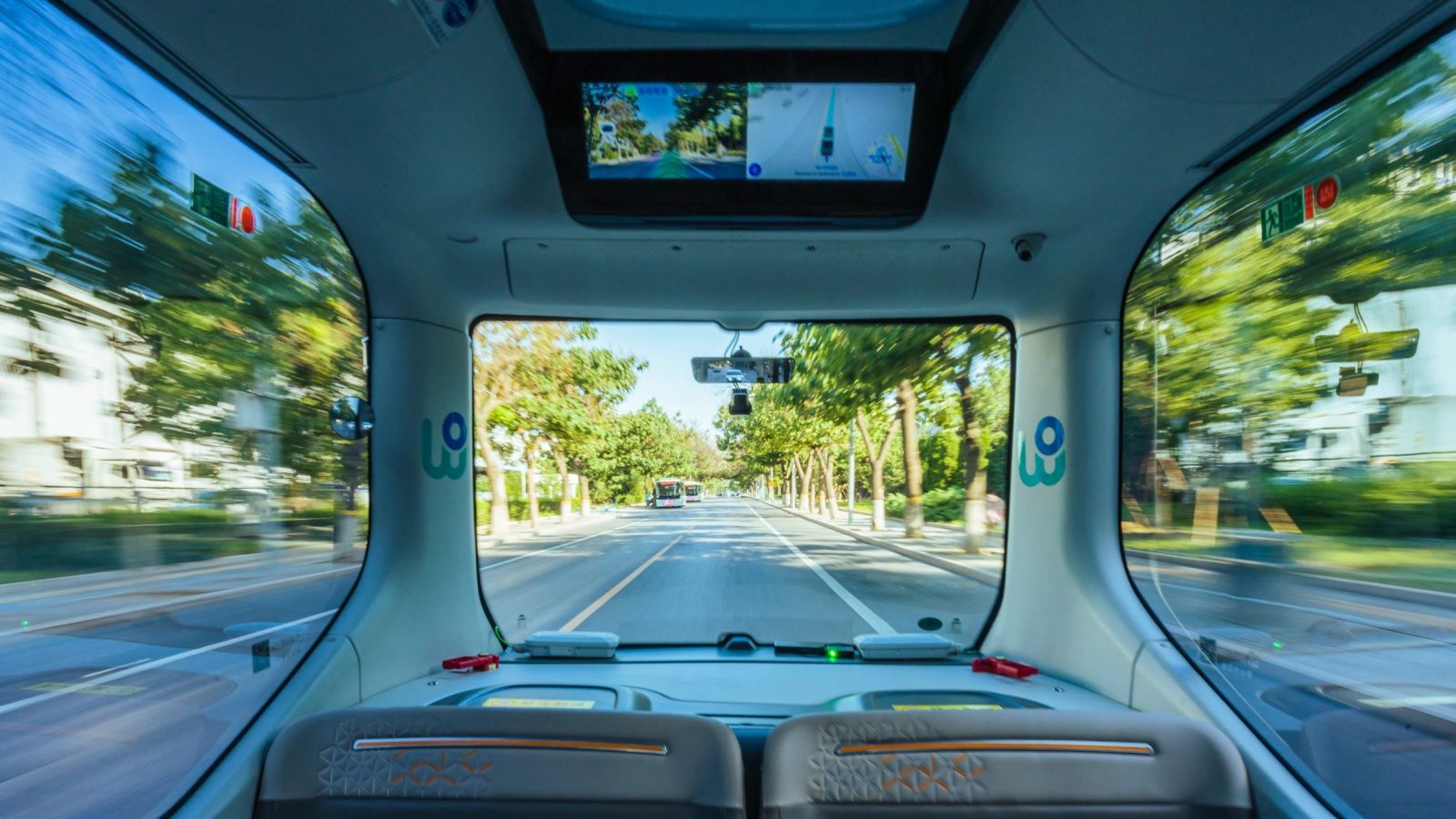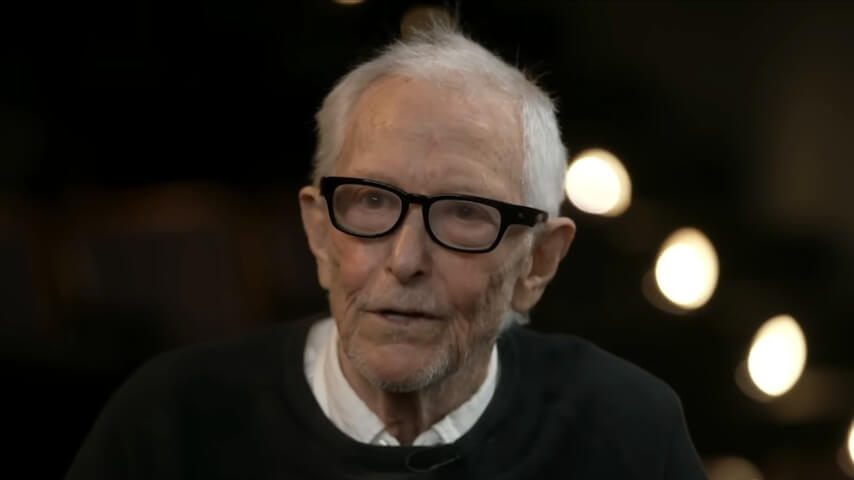Singaporean Sharon Ong’s toddler son, like most kids his age, is fascinated by all modes of transportation. On a recent visit to the resort island of Sentosa, mother and son hopped on and off the monorail, a bus, and the beach tram, saving the latest addition for the last: the Robobus.
The self-driving minibus is the first autonomous vehicle accessible to Singapore’s public. Launched in June by China’s WeRide, the brightly colored shuttle takes about 12 minutes to complete a 1.2-kilometer loop with four stops. As required by law, a safety driver sits up front, observing feeds from the vehicle’s radar, lidar, and multiple cameras on four display screens.
“It was very comfortable,” Ong told Rest of World, after riding on the seven-seater one muggy November morning. “Plus I felt safe.”
Sandy Ong/Rest of World
Autonomous vehicles (AV) are largely synonymous with the U.S. and China, where big tech and automotive firms, including Google, Tesla, General Motors, Baidu, and Pony AI, have invested heavily in driverless vehicles. But far from the Waymos, Cruises, and Apollo Gos, Singapore has slowly been rolling out more AVs to tackle issues ranging from labor shortages to land scarcity, as the vehicles can be deployed only when needed and can park more efficiently, needing fewer parking spaces.
While on-road trials in Singapore began in 2015, the pace has picked up recently, and this year has been particularly eventful. Authorities have greenlit self-driving robot sweepers for street cleaning and AVs to transport goods for FairPrice, the country’s largest supermarket chain. Changi Airport kicked off a two-year trial in July to test autonomous buses to ferry workers, while an all-terrain self-driving vehicle began delivering feed at the bird park.
The AVs will allow the country to automate tasks, such as cleaning, delivering goods, and driving fixed routes, with minimal human supervision, freeing up workers for more complex activities, authorities have said. The country has readily embraced driverless technology primarily because of the promise of greater productivity, Sebastian Yee, director of business development at WeRide in Singapore, told Rest of World.
“The technology has improved and evolved tremendously,” said Yee, whose Guangzhou-based firm also holds driverless permits in China, U.S., and the UAE. “Now people are more open to AVs, and the cost of implementation is also lower. I think this is the right time and right place.”
Worldwide, forecasts for full self-driving cars have consistently missed the mark. But automated features, such as hands-free driving and crash-avoidance systems, are increasingly common, even in mass-produced models, thanks to advances in artificial intelligence, cameras, and radar, and sensor technologies. These features have been touted as making driving safer and easier but have also come under scrutiny after hundreds of crashes, some of which have resulted in fatalities.
-

-

Zelos
Singapore has opted to move more cautiously. It is currently trialing more than a dozen AVs on public roads, including a 13-seater bus from homegrown firm Moovita. The bus ferries polytech students between the school and the train station as well as within the campus. Moovita will soon add two more buses and additional stops, Vice President Ken Chan told Rest of World.
After years of seemingly slow progress, “Singapore is actually starting to move quite far ahead” in terms of deployment, he said.
The intent is clear. When the Singapore government unveiled its Smart Nation initiative in 2014, AVs featured in its goal to enhance citizens’ lives with digital technologies. AVs were also seen as key to “transforming land transport” by addressing long-standing problems, including a chronic shortage of bus drivers in the nation of nearly 6 million people.
“Everyone is really concerned about manpower,” Niels de Boer, senior program director at the Centre of Excellence for Testing and Research of Autonomous Vehicles (CETRAN), told Rest of World. Foreign bus drivers help make up the shortfall, but they are “not a long-term solution,” said de Boer, whose center partners with the country’s Land Transport Authority (LTA).
Self-driving vehicles could plug the labor gap: Singapore ranked first among 30 countries, including the U.S. and China, on the Autonomous Vehicles Readiness Index from consultancy KPMG, which rated nations on their ability to integrate driverless technology into their transportation systems. The city-state also topped the categories of policy and legislation as well as consumer acceptance.
The Southeast Asian nation has clear guidelines for AV safety, testing, and deployment — unlike the U.S. and China, where legislation tends to vary by city, state, or province. The strong government support, and Singaporeans’ willingness to embrace the new technology, is a draw for foreign AV firms as well. In addition, the “exceptionally high safety requirements make the license highly prestigious,” a spokesperson for WeRide told Rest of World.
“After years of seemingly slow progress, Singapore is actually starting to move quite far ahead.”
A Singapore AV license also gives firms a leg up elsewhere. “Singapore has a very good reputation — once we have a public access license, it’s recognized by other customers overseas as well, for example, in the UAE and in Hong Kong,” Terry Zhou, managing director of Chinese firm ZelosTech, told Rest of World. “No matter what achievement we’ve made in China, it’s not duplicable for overseas markets.”
Singapore was Zelos’ first choice when it decided to venture overseas, in large part because of the country’s political neutrality, Zhou said. “When you consider America, it’s not an ideal place for Chinese companies,” he said. Suzhou-based Zelos, which supplied AVs to FairPrice, plans to become a Singapore-registered firm, he said. “That’s our ultimate goal.”

Moovita
Meanwhile, Moovita — a spin-off from the Singapore government’s Agency for Science, Technology and Research, and the only homegrown firm to produce a driverless vehicle — has ventured into China. In October, it launched five self-driving buses in Tianjin Eco-City, making it the first foreign AV provider to obtain a license in China, where thousands of AVs are deployed for a wide range of uses, including parcel delivery and ride-hailing taxis, besides busing and street sweeping.
Moovita plans to set up an AV manufacturing hub with a bus maker in Xiamen, Chan said. Its buses, which are operated by a local firm, are capable of navigating even in fog and snow, conditions alien to tropical Singapore, he said.
The fierce local competition was a draw. “China is a proving ground for us — if we can establish ourselves and have our technology proven there, we feel we should be on par with our competitors,” Chan said.
Globally, autonomous ride hailing and freight trucking can be adopted widely and more easily monitored for safety standards than personal AVs, experts say. In Singapore, the focus for now will be to roll out more logistics AVs and self-driving minibuses on “simpler bus routes with lower traffic and ridership,” Minister for Transport Chee Hong Tat said recently.
“We do want to move faster,” he said. “However, it is important to do so safely in our dense urban environment, and to also ensure that the different elements of our ecosystem are ready.”

















:max_bytes(150000):strip_icc()/Thanksgiving-episodes-111424-c2d9a7cc50f046d98e17d71e2a8a5955.jpg)


